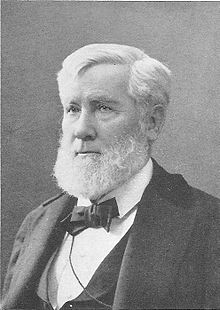| This article needs additional citations for verification. Please help improve this article by adding citations to reliable sources. Unsourced material may be challenged and removed. Find sources: "James Frederick Joy" – news · newspapers · books · scholar · JSTOR (December 2009) (Learn how and when to remove this message) |
| James Frederick Joy | |
|---|---|
 | |
| Member of the Michigan House of Representatives from the 1st district | |
| In office January 1, 1861 – December 31, 1862 | |
| Regent of the University of Michigan | |
| In office January 1, 1882 – December 24, 1886 | |
| Preceded by | E. C. Walker |
| Succeeded by | Charles S. Draper |
| Personal details | |
| Born | (1810-12-02)December 2, 1810 Durham, New Hampshire |
| Died | September 24, 1896(1896-09-24) (aged 85) Detroit, Michigan |
| Resting place | Elmwood Cemetery, Detroit, Michigan |
| Nationality | American |
| Political party | Republican |
| Other political affiliations | Whig Free Soil |
| Children | Henry Bourne Joy |
| Parent(s) | James Joy and Sarah Gee Pickering |
| Alma mater | Dartmouth College (1833), Harvard Law School (1836) |
| Occupation | Lawyer, railroad magnate, politician |
| Signature | |
James Frederick Joy (December 2, 1810 – September 24, 1896) was an American railroad magnate and politician in Detroit, Michigan.
Beginnings
He was born in Durham, New Hampshire, the son of James Joy (1778–1857) of Groton, Massachusetts and Sarah Gee Pickering (1781–1858), daughter of John Pickering.
Education and early career
Educated in Durham, New Hampshire, he entered Dartmouth College, graduating in 1833. From Dartmouth he entered Harvard Law School, from which he graduated in 1836. That year he moved to Detroit and formed a law firm with George F. Porter.
Railroad magnate
In 1846 he entered the railroad business as the lawyer and general counsel to the Michigan Central Railroad. He was subsequently connected with the Illinois Central Railroad. Joy organized the Chicago, Burlington and Quincy Railroad, and was for many years its president. Joy was for several years president of the Wabash, St. Louis and Pacific Railway.
In 1872 he was president and a director of the Michigan Central Railroad, drawing a salary of $8,000 (~$203,467 in 2023) per year. He was at the same time president and a director of the Chicago and Michigan Lake Shore Railroad, and a director of the Detroit, Hillsdale and Indiana Railroad. In 1873 he became president and a director of the Detroit, Lansing and Lake Michigan Railroad, taking over from H.H. Smith. He became president and treasurer of the Detroit Union Railway Depot and Station company at Detroit, Michigan.
Politics
Joy was intimately involved with politics from his early career. A member of the Whig Party and subsequently a Republican, for a time he had also been a member of the Free Soil Party. He was a close friend, confidant and supporter of Abraham Lincoln. At the 1880 Republican National Convention, he gave a speech nominating James G. Blaine for president.
He was a representative in the Michigan Legislature in 1861 and was later elected a Regent of the University of Michigan, serving from 1882 to 1886, when he resigned the office.
He died at his home in Detroit on September 24, 1896.
Notes
- The National Cyclopaedia of American Biography. Vol. XVIII. James T. White & Company. 1922. pp. 120–121. Retrieved November 19, 2022 – via Google Books.
- ^ Joint documents of the State of Michigan for the year 1871, v.1. Lansing: W. S. George and Co. 1872. pp. 46 v. Retrieved November 19, 2022.
- Hinsdale, B.A. (1906). History of the University of Michigan. Ann Arbor, MI: University of Michigan. p. 200.
- "James Frederick Joy". The Chicago Chronicle. Detroit. September 25, 1896. p. 3. Retrieved December 27, 2020 – via Newspapers.com.
External links
Categories:- 1810 births
- 1896 deaths
- American railway entrepreneurs
- Dartmouth College alumni
- Harvard Law School alumni
- Businesspeople from Michigan
- Michigan lawyers
- Michigan Republicans
- Michigan Whigs
- Politicians from Detroit
- Michigan Free Soilers
- Regents of the University of Michigan
- 19th-century American businesspeople
- 19th-century American lawyers
- Chicago, Burlington and Quincy Railroad people
- 19th-century members of the Michigan Legislature